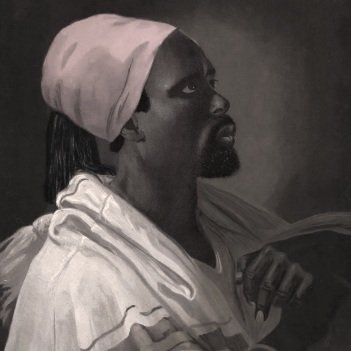Was Haiti’s hero Toussaint Louverture of Royal Blood?
The short answer is YES
Toussaint’s father was Gaou Guinou, an African prince and the son of King Soso of the Allada People. Allada is located in West Africa, today’s southern Benin, and was founded around the 13th century by Aja settlers. The settlement of Allada was in 1600 the most prominent of Aja states, bordering the nearby Oyo Empire, to which the King of Allada was a vassal and tributary.
Although it was an inland kingdom, Allada maintained control of some seaports such as Offra, Jaquin, and Whydah, thus making Allada important in the growing slave trade business, which also granted Allada the economic means to pay its duties to Oyo. Between 1640 and 1690, about 125,000 slaves were sold from Allada, peaking at about 55,000 during the 1680s alone.
Two brothers fought to succeed their father for the throne
Gaou Guinou's father, King Soso, died in 1724 and left two sons, Hussar and Gaou, to fight for the succession. After initially being defeated by Gaou, Hussar fled to Abomey while the younger brother Gaou took power of Great Ardra. Hussar then allied himself with Agaja, the ruler of Dahomey, a powerful nearby kingdom that was already challenging Allada for territorial superiority, and returned to battle his brother for the throne with warriors from Dahomey.
The Dahomey warriors invaded Allada and in a fierce three-day battle Dahomey's troops slaughtered thousands of Allada's warriors and citizens. More than 8,000 of Allada's population were captured and sold
many Bossals recognized him as royalty
The Dahomey warriors invaded Allada and in a fierce three-day battle Dahomey's troops slaughtered thousands of Allada's warriors and citizens. More than 8,000 of Allada's population were captured and sold
Gaou Guinou became the property of Comte Louis Pantaléon Noé on the Plantation Bréda near Cap Français, the then-capital of Saint Domingue (current day Haiti). The French Code Noir mandated that slaves brought to the colonies were to be baptized Catholic, stripped of their African names, and given a European one to assimilate into the French plantation system. That is how Gaou Guinou became Hypolite.
In the slave quarters, many Bossals (newly arrived slaves from Africa) recognized him as royalty and showed him great respect and
African slaves were not permitted to keep their names and were forcefully baptized and given a Christian name
reverence. Hypolite received special treatment at the plantation as he was valued as he was routinely asked to be a peacemaker to appease slaves showing uncontrolled aggression. For 15 years, Gaou, now named Hypolite, was never reconnected with his original family. In the 1740s, Hypolite, coupled with a woman by the given name of Pauline, had five children: three boys and two girls. Their firstborn son was named François Dominique Toussaint of Breda, the future Toussaint Louverture.
Toussaint Louverture is featured in Triumph To Tragedy - Book Two
Daniel Bayard is the Author of the 4-book series of historical fiction novels named Triumph To Tragedy. The books accurately follow the timeline of Haitian history but are written in an interesting story-like reading so the reader can experience the personalities of each of the characters. Book One – Intrigue, Romance, Betrayal, and The Haitian Revolution - debuted in 2021. Book Two – The Rise of Toussaint Louverture – in 2022, The Rise of Jean-Jacques Dessalines in 2023, and The Clash of Petion and Christophe in 2024. Book Five will debut in October of 2025 at La Romana in the Dominican Republic as the book will feature the reunification of the island of Hispaniola and the independence of the Dominican Republic.






